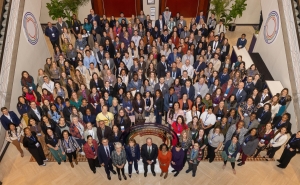New Documents Show McKinsey’s Role in Opioid Epidemic
Company’s inner workings on opioid industry detailed in UCSF-JHU opioid documents archive

The Opioid Industry Documents Archive (OIDA), a project of the University of California, San Francisco (UCSF), and Johns Hopkins University, today released more than 114,000 documents related to McKinsey & Company's work as a management consulting firm for the opioid industry.
They show how McKinsey advised opioid makers Purdue Pharma, Endo Pharmaceuticals, Johnson & Johnson and Mallinckrodt to help them increase sales, despite the growing public outcry over the opioid epidemic. The documents come from the company’s files between 2004 and 2019 and are being released under the terms of the $573 million settlement that McKinsey reached with 47 states, five U.S. territories and the District of Columbia in February 2021.
The two research universities launched the OIDA in March 2021 as a free resource for anyone interested in learning more about the circumstances leading to the opioid crisis, which has contributed to the deaths of more than half a million people. The archive's mission is transparency—to deliver to the public a wealth of information that those who have been personally affected, as well as researchers, policymakers, and others can now analyze to gain insights into the epidemic.
These new documents provide insight into McKinsey’s consulting work for Purdue Pharma and other opioid manufacturers. Materials include scopes of work, proposals, and invoices; presentations prepared for internal discussion and for clients (including Purdue Pharma and Endo Pharmaceuticals); spreadsheets outlining project staffing; and emails responding to news about increased restrictions on opioids. The collection also houses letters from regulatory agencies, including the U.S. Food and Drug Administration, in response to new drug applications from opioid manufacturers; preparation materials for regulatory advisory committee meetings; opioid-related transition documents for state and federal agencies; and other internal files.
“These documents now form a unique and invaluable public resource to help us comprehend the magnitude of harm done to the millions of Americans affected by the opioid crisis,” said Jeremy Greene, MD, PhD, MA, William H. Welch Professor of Medicine and the History of Medicine in the Johns Hopkins School of Medicine. “More generally, they shine a bright light on the murkier intersections of science, industry, and financial interest that continue to characterize the U.S. health care system.”
The archive includes new documents as they become available through resolution of legal action against companies involved in the opioid industry. It builds upon the foundation of the groundbreaking Truth Tobacco Industry Documents archive at UCSF, which for more than two decades has fostered scientific and public health discoveries transforming tobacco policy in the U.S. and around the world.
Last month, the UCSF-JHU OIDA released 1.4 million documents from the generic opioid maker Mallinckrodt, which filed for bankruptcy in 2020. They include emails, memos, presentations, sales reports, budgets, audit reports, Drug Enforcement Administration briefings, meeting agendas and minutes, expert witness reports and depositions of company executives.
“Researchers can leverage these litigation documents to see patterns of industry behavior that could be regulated to protect public health,” said Dorie Apollonio, PhD, MPP, a professor of clinical pharmacy in the UCSF School of Pharmacy. “This will be critical to identifying reforms that can protect against future epidemics like this.”
UCSF and Johns Hopkins University have deep expertise in library science, information technology and digital archiving. The OIDA also relies on scholarship focused on many dimensions of the opioid epidemic, ranging from the history of medicine to pharmaceutical policy to clinical care. Key organizations at UCSF include the Philip R. Lee Institute for Health Policy Studies, Department of Clinical Pharmacy, Department of Humanities and Social Sciences, Department of Family and Community Medicine, and Library. From Johns Hopkins University, the project involves the Johns Hopkins Bloomberg School of Public Health’s Center for Drug Safety and Effectiveness, Welch Medical Library, Department of the History of Medicine, and Sheridan Libraries’ Digital Research and Curation Center.
The archive is guided by a national advisory committee that includes leaders in the field, people who have lost loved ones to the epidemic and others who have been directly affected by it.
For access to the archives, go to: https://www.industrydocuments.ucsf.edu/opioids/.
The University of California, San Francisco (UCSF) is exclusively focused on the health sciences and is dedicated to promoting health worldwide through advanced biomedical research, graduate-level education in the life sciences and health professions, and excellence in patient care. It includes UCSF Health, which comprises three top-ranked hospitals, as well as affiliations throughout the Bay Area. Learn more at https://www.ucsf.edu or see this Fact Sheet.
Johns Hopkins University is America’s first research university. For more than 140 years Johns Hopkins has been a world leader in both teaching and research, with nine academic divisions—the Krieger School of Arts and Sciences, the Whiting School of Engineering, the Bloomberg School of Public Health, the Carey Business School, the Peabody Institute, the Paul H. Nitze School of Advanced International Studies, and the schools of Medicine, Nursing and Education—plus the Applied Physics Laboratory, a nonacademic division that supports national security and pursues space science.
###
Media contacts: Preeti Singh at psingh@burness.com and Carly Kempler at ckemple2@jhu.edu.




